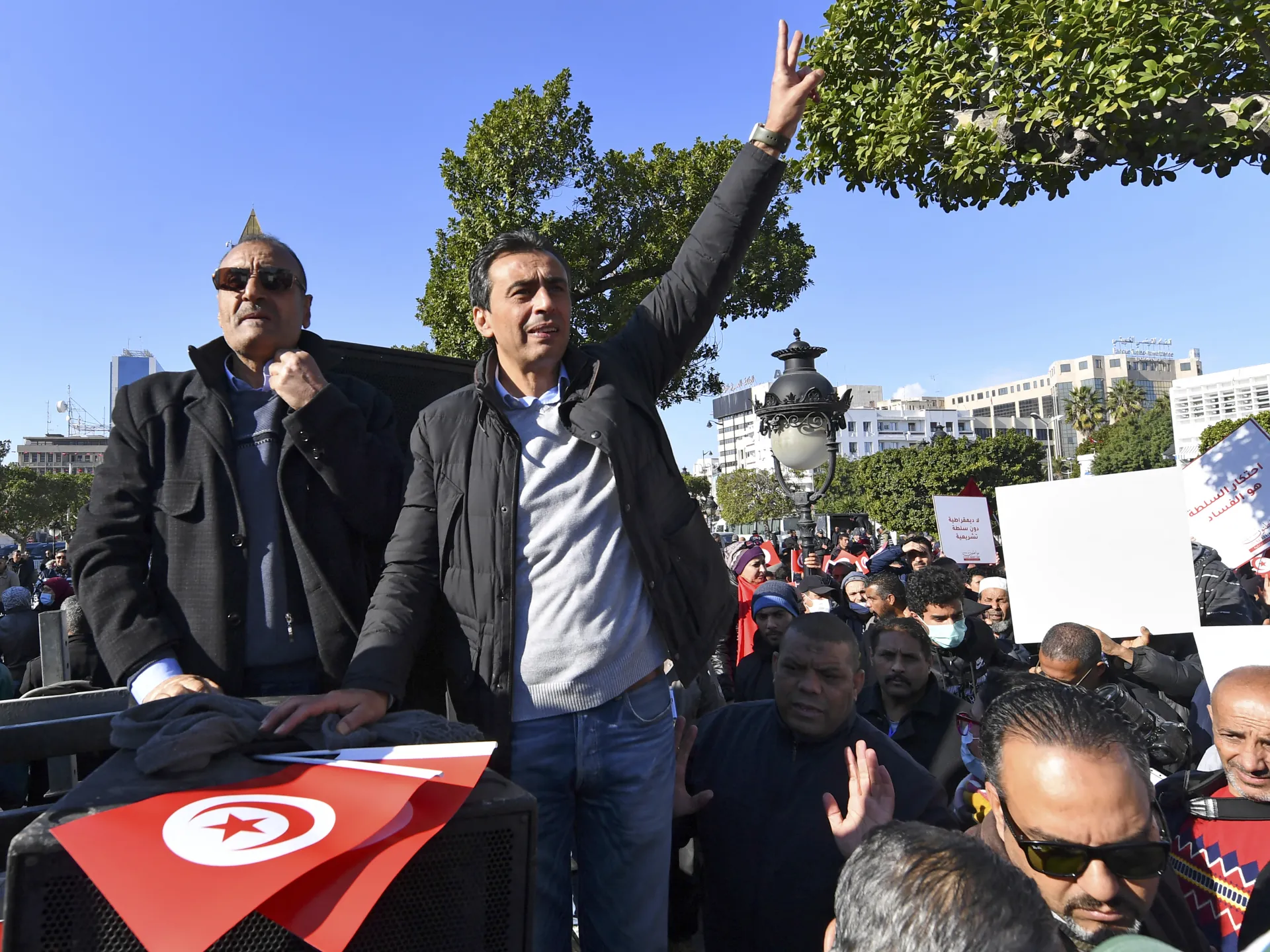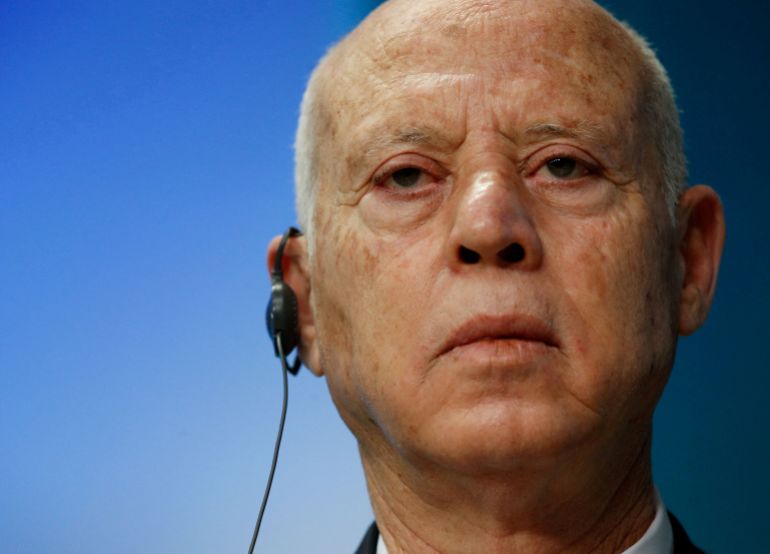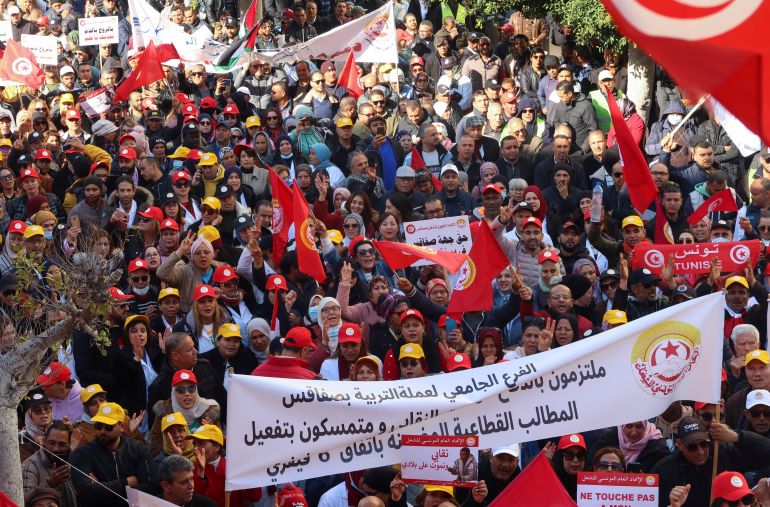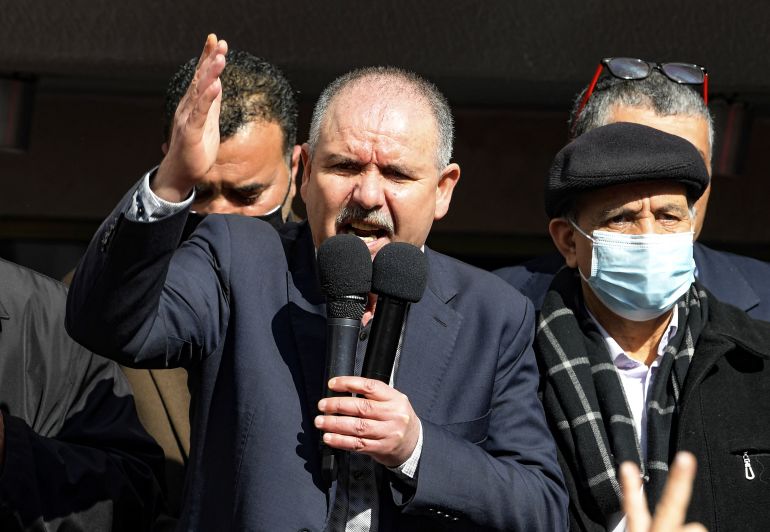Tunisian opposition figures join hunger strike to support jailed politician | Politics News
Prominent members of Tunisia’s political opposition have announced they will be joining a collective hunger strike in solidarity with jailed politician Jawhar Ben Mbarek, whose health they say has severely deteriorated after nine days without food.
Ben Mbarek, the cofounder of Tunisia’s main opposition alliance, the National Salvation Front, launched a hunger strike last week to protest his detention since February 2023.
Recommended Stories
list of 3 itemsend of list
Ben Mbarek’s father, veteran activist Ezzeddine Hazgui, said during a news conference in the capital Tunis on Friday that his son is in a “worrisome condition, and his health is deteriorating”.
Hazgui said his family would launch a hunger strike in solidarity with his jailed son.
“We will not forgive [Tunisian President] Kais Saied,” he added.
The leaders of Tunisia’s major opposition parties also declared on Friday that they would go on hunger strike in solidarity with Ben Mbarek.
Among them is Issam Chebbi, the leader of the centrist Al Joumhouri (Republican) Party, who is also behind bars after being convicted in the same mass trial as Ben Mbarek earlier this year. Wissam Sghaier, another Al Joumhouri leader, said some party members would follow suit.
Rached Ghannouchi, the 84-year-old leader of the Ennahdha party, who is also serving a hefty prison sentence, announced he was joining the hunger protest.
Ghannouchi was convicted in July of “conspiring against state security”, adding to previous convictions, including money laundering, for which he has been sentenced to more than 20 years in prison and for which he claims innocence.
A post on his official Facebook page said Ghannouchi’s hunger strike sought to support Ben Mbarek, but he was also taking a stand to defend “the independence of justice and freedom in the country”.
Ben Mbarek was sentenced in April to 18 years behind bars on charges of “conspiracy against state security” and “belonging to a terrorist group”, in a mass trial slammed by human rights groups as politically motivated.
Rights groups have warned of a sharp decline in civil liberties in the North African country since Saied won the presidency in 2019.
A sweeping power grab in July 2021, when he dissolved parliament and expanded executive power so he could rule by decree, saw Saied jail many of his critics. That decree was later enshrined in a new constitution – ratified by a widely boycotted 2022 referendum – while media figures and lawyers critical of Saied have also been prosecuted and detained under a harsh “fake news” law enacted the same year.
Most recently, lawyer and outspoken Saied critic Ahmed Souab was sentenced to five years in prison on October 31 under Decree Law 54, as the legislation is known.
The Tunisian League for Human Rights said there have been “numerous attempts” to persuade Ben Mbarek to suspend his hunger strike, but he has refused, saying he is “committed to maintain it until the injustice inflicted upon him is lifted”.
Prison authorities denied on Wednesday that the health of any of its prisoners had deteriorated because of a hunger strike.
The Arab Organisation for Human Rights in the UK said questions have been raised regarding the prison administration’s compliance with laws governing medical care for detainees on hunger strike and the “safeguarding of their right to physical safety and human dignity”.
“Tunisian law explicitly stipulates the state’s responsibility to protect the life of any prisoner, even if that person chooses hunger strike as a form of protest,” the rights group said in a statement on Friday.
“The prison administration is therefore obliged to ensure appropriate medical care and regular monitoring,” it said, adding that Ben Mbarek’s protest reflects “a broader climate of political and social tension that transcends his personal situation”.
“His action represents a form of protest against detention conditions and judicial processes that many view as influenced by current political polarisation,” the group said.
“Ultimately, the case of Jawhar Ben Mbarek exposes a deeper crisis concerning respect for the rule of law and the principle of accountability,” it added.
يواصل أستاذ القانون الدستوري جوهر بن مبارك إضرابه المفتوح عن الطعام في محبسه منذ 29 أكتوبر الماضي داخل السجن المدني ببلي (ولاية نابل)، احتجاجاً على اعتقاله فيما يُعرف بقضية “التآمر على أمن الدولة”.
وتظهر المعطيات المتوفرة أن الحالة الصحية لبن مبارك تزداد هشاشة مع استمرار… pic.twitter.com/HrHwe14juE
— المنظمة العربية لحقوق الإنسان (@AohrUk_ar) November 7, 2025
Translation: Constitutional law professor Jawhar Ben Mbarek continues his open-ended hunger strike in his place of detention since October 29 inside the civil prison of Belli (Nabeul Governorate), in protest against his arrest in what is known as the “conspiracy against state security” case.
Available data show that Ben Mbarek’s health condition is becoming increasingly fragile with the continued complete abstention from food, which places his physical state in a critical phase requiring precise and constant medical monitoring.




